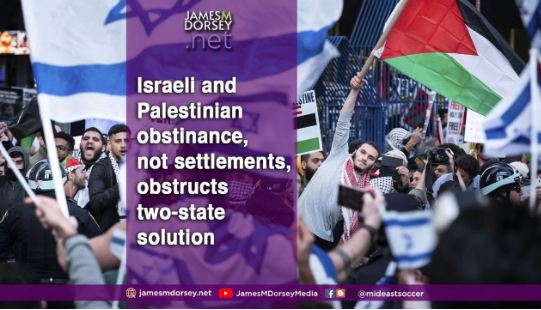When US President Joe Biden insisted there could be no return to the status ante quo once the guns fall silent in Gaza, he revived debate about the viability of a two-state resolution of the Israeli-Palestinian conflict.
Yet, for all practical purposes, Hamas’ brutal October 7 attack against Israel and Israel’s more than month-long indiscriminate bombing of Gaza have likely delayed any realistic effort to resolve the conflict.
As a result, international efforts will largely focus initially on achieving a ceasefire and interim arrangements for governing the devastated Palestinian territory.
Hardening perceptions of the other on both sides of the Israeli-Palestinian divide and a war driven by the most destructive human emotions — survival, anger, fear, despair, and vengeance – complicate, if not make impossible, talking about peace in the immediate future that would involve compromises.
Moreover, any talk of a resolution of the conflict will depend on the political future of Prime Minister Binyamin Netanyahu and his government, the most ultra-nationalist and ultra-conservative in Israeli history, as well as Palestinian players’ prospects.
With a majority of Israelis holding Mr. Netanyahu responsible for the October 7 Israeli intelligence and military failure that allowed Hamas to breach the Jewish state’s defenses, many expect Mr. Netanyahu’s political future to be short-lived once the war is over.
However, Mr. Netanyahu’s demise does not mean he would be succeeded by a lovey-dovey government eager to reverse long-standing Israeli policies and negotiate an equitable deal with the Palestinians.
Benny Gantz, a member of Mr. Netanyahu’s war cabinet, who is touted as the prime minister’s possible successor, has ruled out a return to Israel’s pre-1967 borders and insisted that Palestinians should have an “entity” but not a state.
Israel conquered the West Bank, Gaza, East Jerusalem, and the Golan Heights during the 1967 Middle East war. Israel withdrew from Gaza in 2005 but, assisted by Egypt, has blockaded the territory since 2007.
Many have long believed that the international community’s almost universal support, with Iran the major exception, for a two-state solution involving the creation of an independent Palestinian state alongside Israel, amounted to paying lip service to a concept past its shelf life.
Beyond long-standing Israeli policies designed to thwart the viability of a two-state solution and Palestinian inability to form a united front by bridging the divide between Hamas and Al Fatah, the governing party of President Mahmoud Abbas in the West Bank, Israeli settlements on occupied Palestinian land populated by some 750,000 settlers, are widely seen as having rendered the notion of an independent Palestinian state unviable.
To be sure, the Hamas attack and the Israeli response are likely to harden future Israeli and Palestinian negotiating positions.
For its part, Israel, if and when it decides to sincerely engage in peace talks, is certain to demand demilitarization and a controlling say in Palestinian security affairs. This could prove unacceptable to the Palestinians.
Irrespective of whether Hamas physically survives the Gaza war, support in the West Bank for, at least one of the group’s tenets, armed struggle until a deal with Israel is achieved, is on the increase. So is support for Hamas itself.
Less clear is whether the Gaza war will further weaken support in the territory for Hamas that already was on the decline prior to the hostilities.
However, in contrast to attitudes towards armed struggle, Palestinians are unlikely to back away from widespread support for an independent Palestinian state that recognizes Israel as part of a peace treaty that ends the intractable conflict.
Support for a two-state resolution of the conflict contrasts starkly with Hamas’ insistence that a Palestinian state can at best agree to a long-term ceasefire with Israel but not surrender its claims to all of historic Palestine.
All of this impacts Mr. Biden’s revival of the debate about a two-state solution amid doubts that the United States will seriously pressure Israelis and Palestinians to return to the negotiating table and ensure that discussions are result-oriented rather than another round of motion without movement.
A study by Shaul Arieli, a former Israeli paratrooper, advisor to the governments of Yitzhak Rabin and Ehud Barak on negotiations with the Palestinians, and a scholar, suggests that lack of political will rather than settlements constitute the main obstacle to achieving a two-state solution.
Mr. Ariel’s study concluded that 80 percent of Israeli settlers live on approximately four per cent of the West Bank’s land close to Israel’s pre-1967 border, despite the large number of settlements – 144 legal settlements under Israeli law and 100 illegal outposts – spread throughout the West Bank. Legal settlements include twelve in Jerusalem.

Mr. Ariele suggested that the 80 per cent could remain resident in Israel by swapping West Bank land for Israeli land adjacent to the border. The remaining 20 percent of settlers would have to choose between packing up and moving to Israel or living under Palestinian rule.
“This solution is fully feasible in the field by exchanging territories of the order of four per cent which guarantees that 80 percent of Israelis living beyond the Green Line (the pre-1967 border) will be annexed to Israel… Israel has the ability to deal with the reception of evacuees in the context of residences and workplaces,” Mr. Aureli said in a text message.
Dr. James M. Dorsey is an Honorary Fellow at Singapore’s Middle East Institute-NUS, an Adjunct Senior Fellow at Nanyang Technological University’s S. Rajaratnam School of International Studies, and the author of the syndicated column and podcast, The Turbulent World with James M. Dorsey.

















